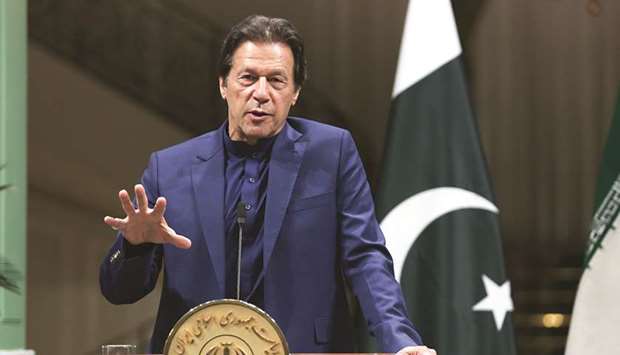Prime Minister Imran Khan said yesterday that the year 2021 will be a year of economic growth for Pakistan, as the government is now prepared to face any challenge that comes its way.
The prime minister said during an event in Islamabad that the construction industry was already on its way up, as cement sales in the country witnessed record sales and the textile sector is running at full capacity.
“Pakistan is moving in the right direction … in 2021 we will facilitate our industries through incentives and business-friendly policies. The wealth creation will be used to reduce the poverty levels,” he said.
The prime minister said that his two major public welfare objectives during the current year would be to ensure universal health coverage through the Health Card Scheme and launching of an initiative under Ehsaas Programme to make sure that no one goes to bed hungry.
Khan said that the government has dealt with the ongoing coronavirus pandemic challenge in an effective manner.
He said that Pakistan is among the few countries that have been lauded by the World Health Organisation (WHO) for its handling of the pandemic.
The coronavirus causes the Covid-19 respiratory disease.
The prime minister said that Pakistan followed the policy of saving lives as well as the livelihood of people.
“If Pakistan wants to industrialise, its best ally is China,” said Khan.
The prime minister is of the view that the economic model of China is best suited for Pakistan’s needs.
“Our government’s entire focus is to convert Pakistan into a welfare state, and reduce poverty and income inequality in the country,” Khan said.
He said that we want the relocation of Chinese industries in Pakistan, especially in the Special Economic Zones (SEZs) set up in the country.
Khan said that the government wants Chinese companies to conduct exports from these SEZs, similar to what has been done in Vietnam.
He highlighted the importance of the agriculture sector, saying that unfortunately not enough attention has been paid on this sector.
Khan added that Pakistan is seeking China’s help to improve its agricultural output.
Meanwhile, Minister Industries and Production Hammad Azhar applauded the recent agreement in the auto sector.
“Pakistan’s auto sales have increased 25% in 2020 as compared to 2019, with demand much higher than production,” he said.
Because of this, the existing players are increasing their capacity, said Azhar, adding that there is a need for new entrants into the sector to fill the space, creating a competitive environment.
“I am happy to learn that automaker MG is introducing six airbags in their vehicles ... I would like to see other auto players to move from two airbags to six,” he said.
He said that other auto players are entering Pakistan this year.
“I will be launching a local auto brand tomorrow in Lahore,” he said.
Later, Prime Minister Khan gave the country’s exporters a pat on the back, congratulating them on “achieving record exports” for the month of December.
Taking to Twitter, he revealed that the country’s exports had registered a growth of 18% over the previous year.
“Well done, and keep up this trend. A major pillar of our government’s economic policy is export enhancement, and we will provide full support to promote export culture,” he added.
Earlier last month, Adviser to the Prime Minister on Commerce Razak Dawood announced that Pakistan’s exports had crossed the $2bn mark for a second consecutive time in November.
The commerce adviser had said that exports increased by 7.2% year-on-year in November, according to the provisional figures received by the government.
“We have just received provisional figures for export of goods. I wish to congratulate our exporters that in these very difficult times with resurgence of Covid-19 cases in Pakistan and globally, our exports have increased by 7.2% in November 2020 over the same period last year,” he had tweeted.
Meanwhile, Khyber Pakhtunkhwa Minister for Housing Dr Amjad Ali said yesterday that Prime Minister Khan has reduced taxes on residential schemes for the low- and middle-income classes, by 90%.
In a statement issued in Peshawar, he said that the prime minister announced the package for the construction and housing sectors, and has extended the subsidy in head of house constructions for the low- and middle-income classes, adding that now they will not pay 5% and 7% tax on their five- and 10-marla houses for the next five years.
Furthermore, Ali said that under the prime minister’s special relief package, the housing sector investors have been exempted of showing their sources of income till June 30, 2021, and low-cost houses will be eligible for bank financing.
The provincial minister said that Rs378bn has been allocated for construction sector till December 2021, while a subsidy of Rs30bn of fixed tax for construction sector industries has been extended for a year.

Prime Minister Khan: Pakistan is moving in the right direction ... in 2021 the wealth creation will be used to reduce the poverty levels.
